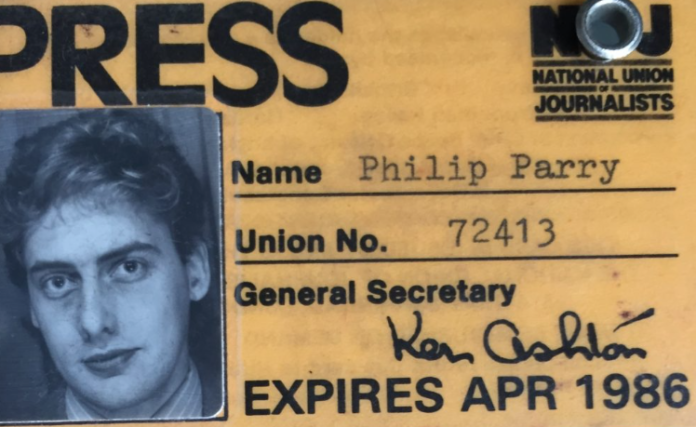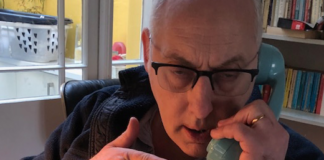- Fight club - 5th March 2026
- Polls apart - 4th March 2026
- Repeating on you… - 4th March 2026

During 23 years with The BBC, and a career of 40 years (when he was trained to use simple language, without using jargon), our Editor, Welshman Phil Parry, has always avoided ‘event-journalism’, but it was a specialism of the disgraced presenter Huw Edwards. Mr Edwards had long been a favourite to host coverage of Royal or state occasions, yet is unlikely to be on our screens for Remembrance Day ceremonies this weekend, after he was identified as the star accused of paying a young person for explicit photographs, and, oddly, he was revered by some nationalists in Wales.
Previously Phil has described how he was helped to break into the South Wales Echo office car when he was a cub reporter, recalled his early career as a journalist, the importance of experience in the job, and made clear that the ‘calls’ to emergency services as well as court cases are central to any media operation.
 He has also explored how poorly paid most journalism is when trainee reporters had to live in squalid flats, the vital role of expenses, and about one of his most important stories on the now-scrapped 53 year-old BBC Cymru Wales (BBC CW) TV Current Affairs series, Week In Week Out (WIWO), which won an award even after it was axed, long after his career really took off.
He has also explored how poorly paid most journalism is when trainee reporters had to live in squalid flats, the vital role of expenses, and about one of his most important stories on the now-scrapped 53 year-old BBC Cymru Wales (BBC CW) TV Current Affairs series, Week In Week Out (WIWO), which won an award even after it was axed, long after his career really took off.
Phil has explained too how crucial it is actually to speak to people, the virtue of speed as well as accuracy, why knowledge of ‘history’ is vital, how certain material was removed from TV Current Affairs programmes when secret cameras had to be used, and some of those he has interviewed.
Earlier he disclosed why investigative journalism is needed now more than ever although others have different opinions, and how information from trusted sources is crucial.
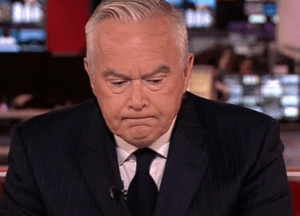
How the mighty are fallen.
One minute the BBC presenter Huw Edwards was riding high, hosting Royal and official state occasions, the next he had COMPLETELY disappeared.
It’s as if he has become a non-person!
In days gone by, you might have expected him to have presented the BBC’s coverage of the King’s Speech this week as the UK Government set out its legislative priorities ahead of the General Election (GE).
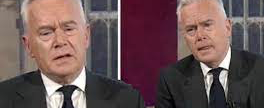
But no.
In the same way you won’t see Mr Edwards anchoring the Remembrance (or Armistice) Day events this weekend either.
This invisibility is because he allegedly paid £35,000 to a teenager in exchange for sexually explicit images, and ‘mental health issues’ were raised about him by his wife.

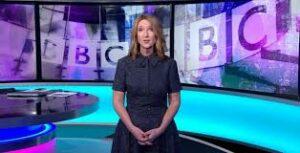
That wasn’t all. According to Newsnight, one BBC staff member claimed they were contacted on social media by him, and the messages left them feeling uncomfortable as well as awkward.
The messages were reportedly suggestive in nature, appeared to be flirtatious, and referred to the appearance of Mr Edwards’ colleague. “There is a power dynamic that makes this inappropriate”, the staff member said. Another BBC employee alleged that Mr Edwards had also sent them a private message on social media which commented, too, on their appearance and gave them a “cold shudder”.

Yet he was venerated by some in the Welsh nationalist community, and there was even a ‘poll’ online which named Mr Edwards as leader of an independent Wales.
I have always found this bizarre, and it speaks to a fundamental insecurity in concepts of ‘Welshness’. There appears to be a feeling that if someone has ‘done well’ in London, then he or she should be supported whatever the context.
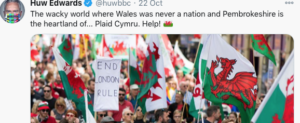 For example, one tweet he published seemed to contradict the rules on impartiality, stating as it did (sarcastically): “The wacky world where Wales was never a nation and Pembrokeshire is the heartland of… Plaid Cymru. Help!” and it included a Welsh flag after the comment. The picture he attached underneath it, was of protesters carrying Welsh flags aloft with a placard of END LONDON RULE clearly visible near the centre of the photograph.
For example, one tweet he published seemed to contradict the rules on impartiality, stating as it did (sarcastically): “The wacky world where Wales was never a nation and Pembrokeshire is the heartland of… Plaid Cymru. Help!” and it included a Welsh flag after the comment. The picture he attached underneath it, was of protesters carrying Welsh flags aloft with a placard of END LONDON RULE clearly visible near the centre of the photograph.
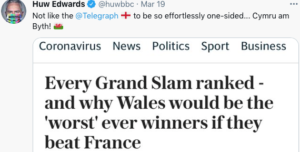 Mr Edwards’ past comments in support of Wales, or attacking The Conservatives were often seized on by a headline-grabbing nationalist website which is backed by the taxpayer, Nation.Cymru (NC).
Mr Edwards’ past comments in support of Wales, or attacking The Conservatives were often seized on by a headline-grabbing nationalist website which is backed by the taxpayer, Nation.Cymru (NC).
These have included his reaction to contentious stories in UK papers, such as: “Every Grand Slam ranked – and why Wales would be the ‘worst’ ever winners if they beat France”.

Mr Edwards responded to this piece using heavy irony and Welsh nationalism: “Not like the The Telegraph to be so effortlessly one-sided… Cymru am Byth!”.
But NC apparently supported Mr Edwards (by ‘reporting’ this in a so-called ‘story’). They published a ‘news’ piece proclaiming: “Huw Edwards slams former Telegraph editor for anti-Welsh language article”. Following the remark about Plaid Cymru (Plaid) it ran a ‘story’ that: “Broadcaster Huw Edwards has protested the BBC’s new rules on using social media by unleashing a cascade of Welsh flags”.
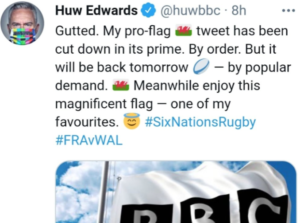 Using social media on the eve of a rugby game against France (when during it, the punditry of his BBC colleague Jonathan Davies was attacked on social media), Mr Edwards said that he was: “Gutted my pro-flag tweet has been cut down in its prime. By order. But it will be back tomorrow – by popular demand. Meanwhile enjoy this magnificent flag – one of my favourites. Hashtag SixNationsRugby Hastag FRAvWAL” – with a series of emojis included.
Using social media on the eve of a rugby game against France (when during it, the punditry of his BBC colleague Jonathan Davies was attacked on social media), Mr Edwards said that he was: “Gutted my pro-flag tweet has been cut down in its prime. By order. But it will be back tomorrow – by popular demand. Meanwhile enjoy this magnificent flag – one of my favourites. Hashtag SixNationsRugby Hastag FRAvWAL” – with a series of emojis included.

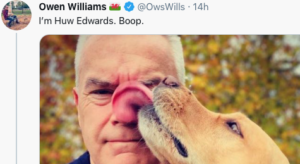 Before the gripping match a supporter of his shared a series of pictures on Twitter (now X),(including one of Mr Edwards being licked by his dog), which he showed his approval of by saying: “Share the love this epic thread was the tonic I needed – before kick off”.
Before the gripping match a supporter of his shared a series of pictures on Twitter (now X),(including one of Mr Edwards being licked by his dog), which he showed his approval of by saying: “Share the love this epic thread was the tonic I needed – before kick off”.
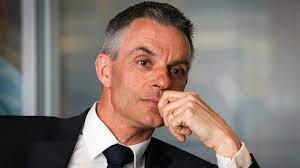
As Mr Edwards stated, he was ordered to drop a post of himself in front of a Welsh flag which he declared was a “backdrop for @BBCNews at Ten”, but the very fact that he had created it in the first place, showed how rules on neutrality were flouted by him when they have been emphasised by his superior, Director General Tim Davie.
However his announcements were not met with wild acclaim by the leader of the Welsh Conservatives in the Welsh Parliament/Senedd Cymru (WP/SC) Andrew RT Davies, who has said on Twitter/X that The BBC was: “Employing presenters who openly mock… (Britain)… Ridiculous!”, and linked it to the ‘Gutted’ post.
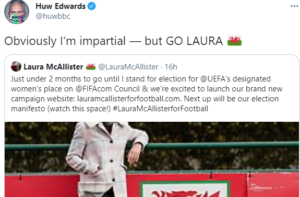 But these messages fell into a familiar pattern, and in one post Mr Edwards had endorsed an opinionated columnist who said she was a “Welsh woman” and that the BBC Proms made her feel like a “foreign tourist”.
But these messages fell into a familiar pattern, and in one post Mr Edwards had endorsed an opinionated columnist who said she was a “Welsh woman” and that the BBC Proms made her feel like a “foreign tourist”.
He had backed writer and academic Laura McAllister’s Twitter/X announcement that there was less than two months before she stood for election to a football governing body’s council. Mr Edwards said, initially again ironically:“Obviously I’m impartial —- but GO LAURA” with a Welsh flag after the comment. Yet several years ago Ms McAllister had written in her regular Welsh newspaper column: “I do realise that my national identity has been shaped and expressed largely through sport, but the Proms’ Union Jack waving (albeit with a smattering of European, Welsh and Scottish flags mixed in) and Rule Britannia make me feel like a foreign tourist”.
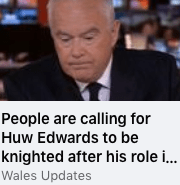 All of this confirms that Mr Edwards was at the centre of controversies even before the recent allegations.
All of this confirms that Mr Edwards was at the centre of controversies even before the recent allegations.
He was the go-to presenter for coverage of Royal occasions, and there were even calls on social media to knight him, because of his role in covering The Queen’s death. But this is enormously ironic as there is a deep antipathy among some in nationalist circles, towards the Royal Family.
The more I know, the more I realise I don’t know.
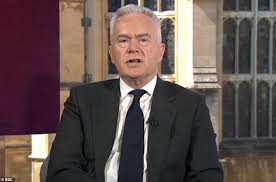
A case in point is the hero-worshipping by some (although not all) Welsh nationalists of a man who hosted Royal occasions, when the Royal Family is HATED by Welsh nationalists, and who presented coverage of official UK state events, when some of those same people want INDEPENDENCE from the UK!
I wish I understood, but I don’t…
The memories of Phil’s remarkable decades long award-winning career in journalism (when impartiality was crucial) as he was gripped by the rare neurological disabling condition, Hereditary Spastic Paraplegia (HSP), have been released in a major book ‘A GOOD STORY’. Order the book now!

Regrettably publication of another book, however, was refused, because it was to have included names.









